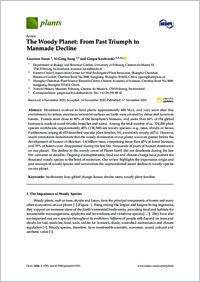The woody planet : from past triumph to manmade decline
- Fazan, Laurence Department of Biology and Botanical Garden, University of Fribourg, Chemin du Musée 10, 1700 Fribourg, Switzerland
- Song, Yi-Gang Eastern China Conservation Center for Wild Endangered Plant Resources, Shanghai Chenshan Botanical Garden, Chenhua Road No.3888, Songjiang, Shanghai 201602, China - Shanghai Chenshan Plant Science Research Center, Chinese Academy of Sciences, Chenhua Road No.3888, Songjiang, Shanghai 201602, China
- Kozlowski, Gregor Department of Biology and Botanical Garden, University of Fribourg, Chemin du Musée 10, 1700 Fribourg, Switzerland - Shanghai Chenshan Plant Science Research Center, Chinese Academy of Sciences, Chenhua Road No.3888, Songjiang, Shanghai 201602, China - Natural History Museum Fribourg, Chemin du Musée 6, 1700 Fribourg, Switzerland
-
17.11.2020
Published in:
- Plants. - 2020, vol. 9, no. 11, p. 1593
English
Woodiness evolved in land plants approximately 400 Mya, and very soon after this evolutionary invention, enormous terrestrial surfaces on Earth were covered by dense and luxurious forests. Forests store close to 80% of the biosphere’s biomass, and more than 60% of the global biomass is made of wood (trunks, branches and roots). Among the total number of ca. 374,000 plant species worldwide, approximately 45% (138,500) are woody species—e.g., trees, shrubs or lianas. Furthermore, among all 453 described vascular plant families, 191 are entirely woody (42%). However, recent estimations demonstrate that the woody domination of our planet was even greater before the development of human civilization: 1.4 trillion trees, comprising more than 45% of forest biomass, and 35% of forest cover disappeared during the last few thousands of years of human dominance on our planet. The decline in the woody cover of Planet Earth did not decelerate during the last few centuries or decades. Ongoing overexploitation, land use and climate change have pushed ten thousand woody species to the brink of extinction. Our review highlights the importance, origin and past triumph of woody species and summarizes the unprecedented recent decline in woody species on our planet.
- Faculty
- Faculté des sciences et de médecine
- Department
- Département de Biologie
- Language
-
- English
- Classification
- Biological sciences
- License
- License undefined
- Identifiers
-
- RERO DOC 329887
- DOI 10.3390/plants9111593
- Persistent URL
- https://folia.unifr.ch/unifr/documents/309003
Statistics
Document views: 100
File downloads:
- koz_wpf.pdf: 154
